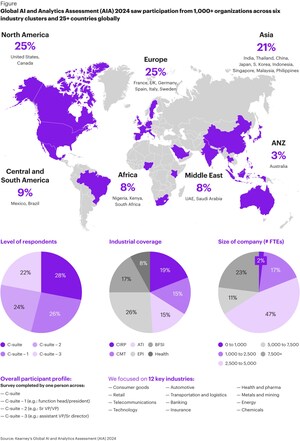- Implementing ESG strategies has the potential to yield high value, for companies and society alike.
- Yet significant barriers to realizing the full potential of this ESG value remain.
- To maximize ESG value and overcome these barriers, systemic changes—sometimes incremental and other times profound—are required.
WASHINGTON, Dec. 8, 2022 /PRNewswire/ -- As the recently concluded Sharm el-Sheikh Climate Change Conference (COP27) demonstrated, concern about climate change and broader environmental degradation continues to rise. No surprise then that environmental, social, and governance (ESG) criteria are proliferating in business strategies, with the number of companies integrating ESG into their business models increasing steadily over recent years. Although implementing such strategies can yield high value, significant barriers to reaching the full potential of ESG value remain.
Systemic changes will be required to attain greater ESG value and overcome these barriers, according to the 2022 Council Perspective from the global strategy and management consulting firm Kearney. The new report by Kearney's Global Business Policy Council, entitled Can adopting leading ESG practices enhance corporate value?, analyzes how the future of ESG might unfold—and how companies can best respond to maximize the value of ESG.
Kearney research of capital markets across sectors suggests that ESG can drive long-term company performance by increasing company valuation, creating new lines of business, enhancing consumer margin and volume, and reducing costs. The pursuit of ESG goals can also attract talent and improve worker productivity, while companies that fail to act face growing reputational risks from consumers and, potentially, penalties from regulators.
The report explores the obstacles that companies face in reaching the full potential of ESG value—and what they can do to navigate them. "While the ESG regulatory landscape continues to evolve," said report co-author Erik Peterson, managing director of the Global Business Policy Council and Kearney partner, "these measures can risk adding to an 'alphabet soup' of frameworks that can be challenging for companies to track and adhere to." Yet these challenges are not limited to regulators and policymakers, Peterson added. "The pressure is on for companies pursuing ESG. Shareholders want to see companies follow ESG best practices—without any negative impact on the bottom line—and stakeholder demands can sometimes be in conflict, forcing difficult decisions and circumstances."
Overcoming such barriers to the ESG transition will require making some systemic changes. "Extensive changes—some evolutionary and some revolutionary—will be needed in a number of business areas," argued report co-author Nigel Andrade, senior fellow at the Global Business Policy Council and Kearney partner. "This ranges from boards integrating ESG into their strategic decisions to the creation of new roles and functions at the C-suite level," Andrade added. The report also examines additional factors, including the emergence of new business models and new forms of capital.
Yet the future of ESG is unclear, particularly as uncertainties regarding the level of international and domestic cohesion on ESG issues remain high. To account for these uncertainties, the report explores four plausible ESG scenarios through the end of the decade. "Regardless of the future that unfolds, companies seeking the value potential in ESG can take strategic action today," added report co-author Terry Toland, manager at the Global Business Policy Council. "Even in future scenarios where ESG is perceived as a risk, there are opportunities for strategic companies to realize ESG value—for their business and society more broadly."
Read the full report here.
As a global consulting partnership in more than 40 countries, our people make us who we are. We're individuals who take as much joy from those we work with as the work itself. Driven to be the difference between a big idea and making it happen, we help our clients break through.
To learn more, visit https://www.kearney.com/.
The Global Business Policy Council is a specialized foresight and strategic analysis unit within Kearney. Since its first CEO Retreat in 1992, the Council has been a strategic service for the world's top executives, government officials, and business-minded thought leaders. Through exclusive global forums, public-facing thought leadership, and advisory services, the Council helps decipher sweeping geopolitical, economic, social, and technological changes and their effects on the global business environment. The Council consistently ranks near the top of the University of Pennsylvania's list of best private sector think tanks.
To learn more about the Global Business Policy Council, visit https://www.kearney.com/business-policy.
Media contact:
Meir Kahtan
Meir Kahtan Public Relations, LLC
+1 917-864-0800
[email protected]
SOURCE Kearney

WANT YOUR COMPANY'S NEWS FEATURED ON PRNEWSWIRE.COM?
Newsrooms &
Influencers
Digital Media
Outlets
Journalists
Opted In




Share this article